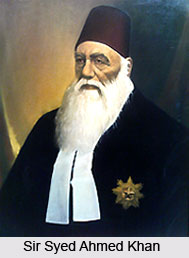 Legacy of Sir Syed Ahmed Khan is filled with richness in reformist movements and social changes. He lived the last twenty years of his life in Aligarh, and is regarded as the most influential Islamic politician and entrepreneurs in the 19th-20th century. He was also the most sorts after politician in India - who had the power to move a majority of Muslims.
Legacy of Sir Syed Ahmed Khan is filled with richness in reformist movements and social changes. He lived the last twenty years of his life in Aligarh, and is regarded as the most influential Islamic politician and entrepreneurs in the 19th-20th century. He was also the most sorts after politician in India - who had the power to move a majority of Muslims.
Sir Syed, after battling serious illness, died on 27th March 1898. He was also buried besides Sir Syed Masjid inside the very campus of Aligarh Muslim University. His funeral was attended by millions of students, Muslim leaders and British officials. Sir Syed is also widely respected across the South Asia as a successful Muslim reformer and visionary. And at the very same time he sought to politically provide allegiance to the British Government. Sir Syed, an awarded loyalist of the British Empire in India, was nominated as a member of Civil Service Commission in the year 1887 by Lord Dufferin.
In the year 1888, he also set up the United Patriotic Association at Aligarh to promote political co-operation with the British and Muslim participation in the government. In the same year Sir Syed was knighted by the British Government and the very next year he received an LL.D. from the Edinburgh University.
The educational institution he formed - Aligarh Muslim University remains as one of the post important institutions. Well-known alumni of Aligarh also include Muslim political leaders Maulana Mohammad Ali, Abdur Rab Nishtar, Maulana Shaukat Ali and Maulvi Abdul Haq, who is hailed in Pakistan as Baba-e-Urdu (Father of Urdu). Liaquat Ali Khan and Khawaja Nazimuddin, the first two Prime Ministers of Pakistan and also the President Dr. Zakir Hussain, are amongst Aligarh`s most famous graduates.
This article is a stub. You can enrich by adding more information to it. Send your Write Up to content@indianetzone.com






